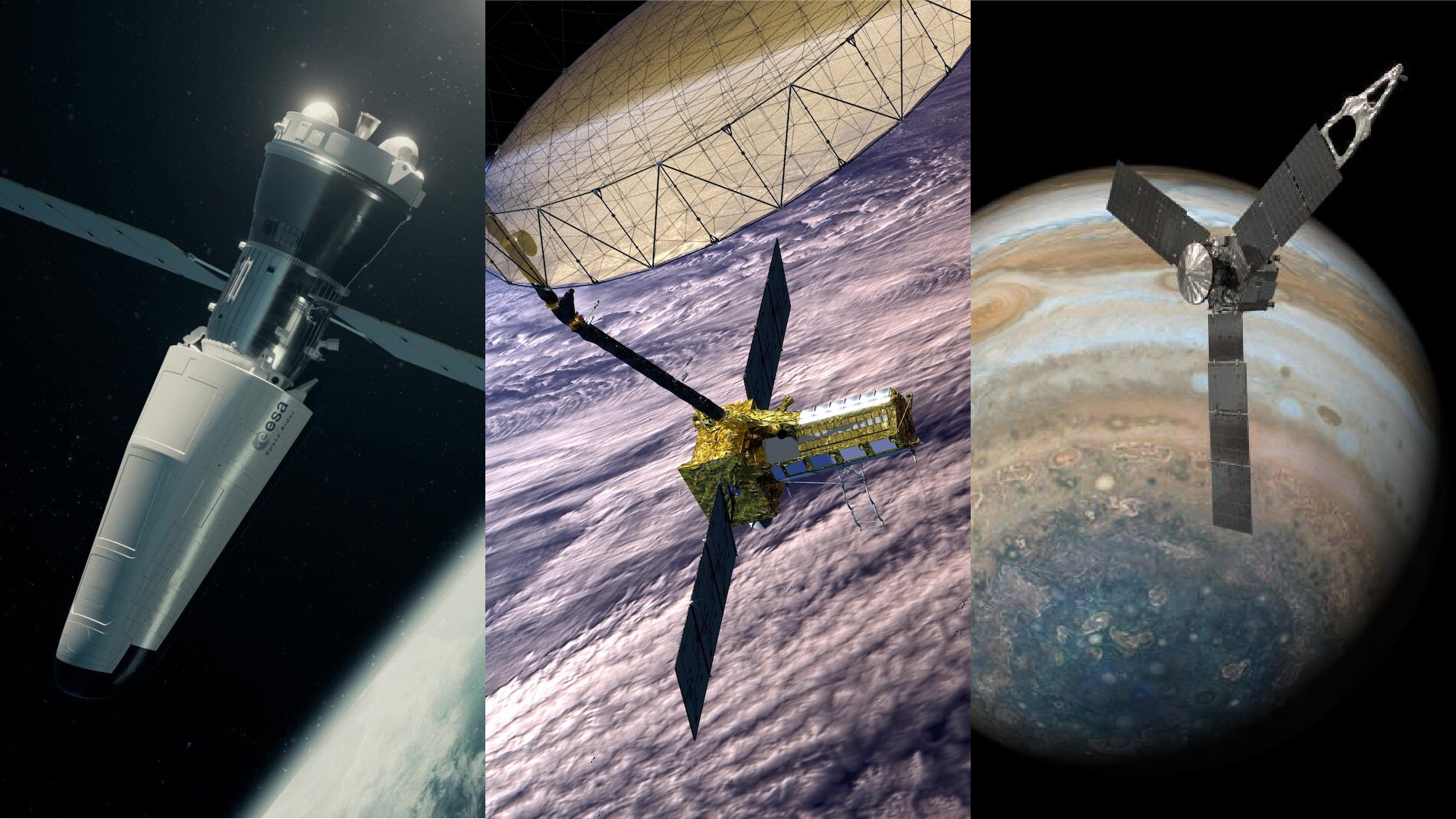
Fishy Rain to Fire Whirlwinds: The World's Weirdest Weather
When Mother Nature Throws a Curve Ball
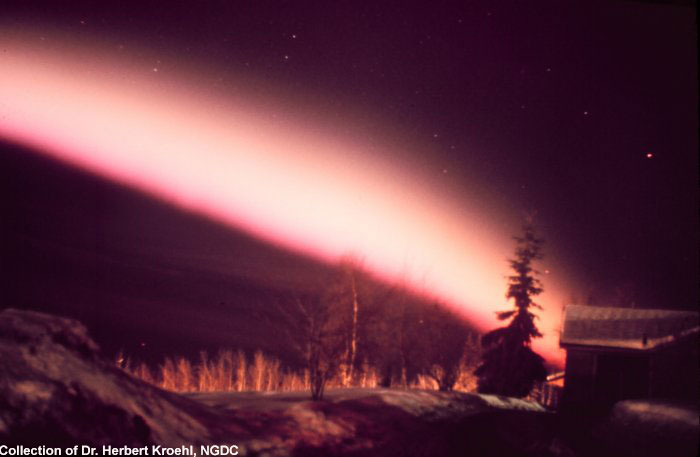
As if tornadoes, hurricanes and blizzards weren't enough to keep us on our toes, Mother Nature occasionally surprises us with some truly odd weather phenomena: From whirlwinds of fire to bloody rains, it's a strange world of weather out there.
Raining Fish and Frogs

From California to England to India, people have periodically reported a fishy form of precipitation: small animals, such as fish, frogs, and snakes have occasionally fallen unexpectedly from the sky, sometimes miles away from water. Waterspouts whirling over lakes or oceans can suck water and whatever is in it up into the clouds above them. The strong winds of these storm clouds can carry their flopping cargo long distances before dumping them on unsuspecting people below.
Great Balls of Fire

For centuries, people have reported an electrical oddity invading their homes, usually during thunderstorms. Balls of light, ranging from the size of a golfball to a football, occasionally float through the air during storms, undoubtedly surprising anyone they happen to encounter. Known as ball lightning, they have no smell and emit no heat and little sound. They generally disappear with a ?pop? when they encounter something electrical, like a television, though they occasionally explode more violently, sometimes starting fires. These glowing spheres not only mystify those who happen to encounter them, but scientists as well?as yet, there is no prevailing explanation for how ball lightning forms.
The Sky is Bleeding!
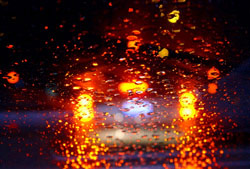
Showers of blood falling from the sky may sound like something out of a Hollywood horror film, but such scarlet-tinted rains have been reported since ancient Roman times. Though they often horrified the people they fell upon, these rains were not actually blood?they were caused by dust or sand blown into the atmosphere and carried long distances by strong winds, eventually mixing with rain clouds and coloring the rain. In Europe, these red rains are usually dyed by dust carried across the continent from Saharan sand storms. (Other colored rains have also been spotted and seem to be caused by similar sources: pollens can create a startling yellow rain, dust from coal mines and ominous black rain, and some dusts a milky white rain.)
Seeing Triple
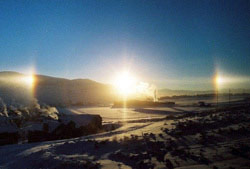
Even on a clear, sunny day, the sky can hold some surprises, at least for the eyes. If the Sun is close to the horizon and feathery cirrus clouds sit high in the sky, 'ghost' images of the Sun will sometimes materialize on either side of it, giving the appearance of three Suns shining in the sky. These ghostly Suns are actually brightly colored spots of light created when the Sun's rays are refracted by tiny ice crystals in the high clouds. Though they are a fairly common optical phenomenon, they are not always seen: after all, how often do you look directly at the Sun? [Without proper eye protection, looking at the Sun can blind you.]
Once in a Blue Moon
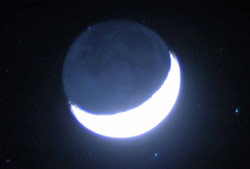
Though the term 'blue Moon' usually refers to occasions every two and a half years when a full Moon occurs twice in one calendar month, there are rare occasions when the Moon really does look blue. Forest fires and volcanoes can shoot ash and soot high into the atmosphere where it mixes with water droplets. These sooty droplets can travel thousands of miles around the globe and are just the right size to scatter the moon's light, making the moon appear blue.
Sea Monster or Spinning Water?
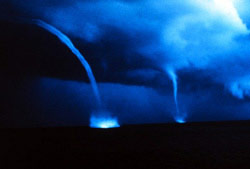
The Loch Ness monster may be nothing more than an overactive column of spinning water. Small whirlwinds, sometimes called 'water devils,' can form over warm water, sucking the water up with them to create a funnel. These water devils can spin around erratically, sometimes making hissing or bubbling noises. These startling sounds combined with the long, neck-like appearance could certainly give anyone nearby the impression that a terrifying sea monster is about to jump out at them.
Whirlwinds of Fire
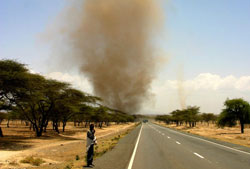
Though they don't have the ferocious, house-lifting winds of a tornado, dust devils can certainly look scary. These whirlwinds, essentially smaller versions of tornadoes, form when there is intense heat at the ground, which causes the air above it to rise, and winds that can cause the rising air to spin. The whirlwind picks up dust from the ground, hence its name. An even scarier relative is the fire devil, which forms over the intense heat of forest fires, pulling up ropes of fire that spin furiously above the blaze.
Sprites, Jets and Elves, Oh My!
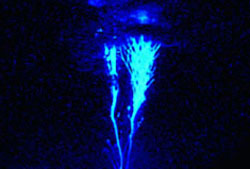
For years, pilots have reported seeing strange colored flashes of light shooting out of the tops of storm clouds, usually to the disbelief of many, But in recent years, scientists have found proof that these strange types of lighting exist. Red sprites are blasts of red light that soar up to 50 miles above the Earth, usually in clusters of two or more. Their cousins, blue jets, are cones of bluish light that occur lower in the atmosphere than red sprites. Occurring at about the same time as red sprites are elves, a pancake-shaped red glow created by the heat of conventional lightning below. These flashes last only thousandths of a second, and scientists are still investigating exactly what causes them.
St. Elmo's Fires

During thunderstorms, people have reported seeing balls of 'fire' dancing on ships' masts, the horns of cattle, and their own heads. These small, luminous balls, called St. Elmo's fires, are static electric discharges that occur during thunderstorms and course up tall objects. While they aren't dangerous themselves, they can occur before a lightning strike, so it's probably best to get out of the way.
Ice Fall/Bomb
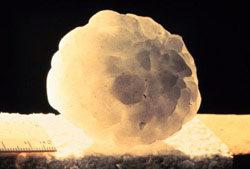
Most people who have been in a strong thunderstorm have experienced hail, the chunks of ice, usually no larger than a softball, that sometimes fall from the storm clouds. But occasionally hailstones far, far larger (one was recorded at 80 pounds) fall from the sky, startling anyone nearby and often shattering into smaller chunks when they hit the ground. More mysterious are the giant chunks that have sometimes plummeted to the ground without a cloud in the sky. While some such events have been chalked up to ice fall off the wings of planes, others still have no explanation as to what caused them.
Sign up for the Live Science daily newsletter now
Get the world’s most fascinating discoveries delivered straight to your inbox.

Andrea Thompson is an associate editor at Scientific American, where she covers sustainability, energy and the environment. Prior to that, she was a senior writer covering climate science at Climate Central and a reporter and editor at Live Science, where she primarily covered Earth science and the environment. She holds a graduate degree in science health and environmental reporting from New York University, as well as a bachelor of science and and masters of science in atmospheric chemistry from the Georgia Institute of Technology.







